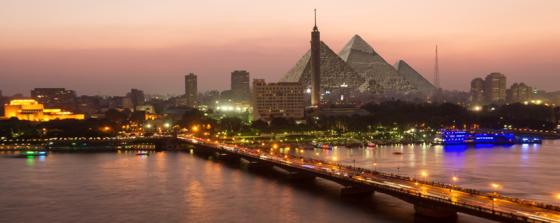
(Central Israel) — Having just landed back in Israel last night to rejoin my family and celebrate Passover, I was heart-broken to hear the news out of Cairo.
But let’s be clear: the savage attacks by the Islamic State yesterday against Christians in two Egyptian churches packed for Palm Sunday are not isolated incidents. They are the latest salvos in a dangerous new ISIS offensive to destabilize Egypt, and they underscore the urgency of close Egyptian security cooperation with both the U.S. and Israel to neutralize this jihadist threat.
Consider the context of the two church attacks.
In May 2016, ISIS released a blizzard of videos and social media statements in support of “Sinai Province,” one of their jihadist affiliates. Since then, ISIS in the Sinai has ramped up its terrorist attacks against Egyptian citizens and military forces in Sinai and rocket attacks against civilians in southern Israel.
“The series warns Egyptians against adopting the ‘new religion’ of democracy, and urge them to ‘wake up and realize [their] salvation is with sharia,'” noted an analysis in the journal, Foreign Affairs, headlined, ISIS TARGETS EGYPT: Why The Group Set Its Sights On Sinai. “They play up Sinai’s location as the ‘land of the prophet Moses,’ denounce Egyptian President Abdel Fattah el-Sisi as a new Pharaoh, and curse him for ‘protecting the Jews.'”
“In addition to criticizing the Egyptian government, the latest videos dub Sinai the ‘gateway to Palestine,’ from which ISIS will ‘liberate’ Jerusalem and its iconic al-Aqsa Mosque,” the Foreign Affairs articles explains. “The videos show Egyptian leaders and military officials meeting Israeli counterparts, and call Israel’s Jews ‘victims in waiting,’ whom ISIS will deal with after the Egyptian ‘apostates.’ As one fighter warns, Israelis will soon meet the same fate as their supposed Egyptian collaborators: ‘the knives used to slice open the necks of your spies will slaughter your soldiers tomorrow.'”
Then, just two months ago, ISIS released a 20-minute video specifically declaring war on Egypt’s Coptic Christian community — which comprises about 10 percent of Egypt’s 93 million people — and vowing to assassinate Coptic Pope Tawadros II.
In the video, “a masked man, identified as Abu Abdallah al-Masri…promises that Islamists jailed in Egypt will be freed soon, when the group takes the capital,” reported The Times of London. “Al-Masri, which means ‘The Egyptian,’ was the nom-de-guerre given by the terrorist group to the militant it claims was behind a December suicide bombing that targeted a Cairo chapel within St Mark’s Cathedral, the seat of the Coptic Pope. Twenty-nine people, mostly women and children, were killed in the blast, which was the deadliest to hit Egypt’s Christians in living memory.”
“To my brothers in captivity: rejoice, you believers, do not falter or grieve. I swear to God we will very soon liberate Cairo and free you from captivity,” the militant said, clutching an assault rifle in a wheat field. “We will come bearing explosives, I swear we will, so rejoice you believers.”
It was in this context, then, that President el-Sisi just made his first visit to Washington to meet with President Trump and rebuild U.S.-Egyptian relations, especially with regards to security cooperation. It was also in this context that ISIS chose to strike two Egyptian churches, and that el-Sisi subsequently announced a “state of emergency” to deploy additional security forces across the country to protect Egyptians from the jihadists.
Please join me in praying for Egypt. Lynn and our four sons and I lived in Cairo for nearly three months in late 2005 while I was researching and writing a book. We spent several weeks on the Sinai peninsula, even traveling to the traditional site of Mount Sinai where Moses met with God and received the Ten Commandments. We have a deep love for the people of Egypt and have deep concerns over the dangers that the people and leaders of Egypt face.
As such, I appreciated the opportunity to meet with President el-Sisi last week, to better understand his vision for Egypt and how he intends to deal with the ISIS threat, and numerous other challenges, from improving Egypt’s economy, to improving relations between Muslims and Christians, to helping Israelis and Palestinians find a way to live together in peace. In October 2013, I wrote of Mr. el-Sisi, “clearly he is someone to keep an eye on.” In January 2014, I wrote a column titled, “Who to watch in 2014 — #4: Egyptian army chief al-Sisi. He’s set to announce presidential bid in 72 hours.”Given recent developments, I will continue to write about him and trends in Egypt.
Here’s the latest from the Associated Press:
- Suicide bombers struck hours apart at two Coptic churches in northern Egypt, killing 44 people and turning Palm Sunday services into scenes of horror and outrage at the government that led the president to call for a three-month state of emergency.
- The Islamic State group claimed responsibility for the violence, adding to fears that extremists are shifting their focus to civilians, especially Egypt’s Christian minority.
- The attacks in the northern cities of Tanta and Alexandria that also left 126 people wounded came at the start of Holy Week leading up to Easter, and just weeks before Pope Francis is due to visit.
- Pope Tawadros II, the leader of the Coptic church who will meet with Francis on April 28-29, was in the Alexandra cathedral at the time of the bombing but was unhurt, the Interior Ministry said.
- It was the single deadliest day for Christians in decades and the worst since a bombing at a Cairo church in December killed 30 people….
——————
Without Warning — my new thriller about ISIS operatives launching catastrophic terrorist attacks inside the U.S. using chemical weapons captured in Syria — is now available in hardcover, e-book and audio formats from Amazon, Barnes & Noble, CBD, Lifeway, and your favorite general market and Christian bookstores. To order online, please click here.
———————